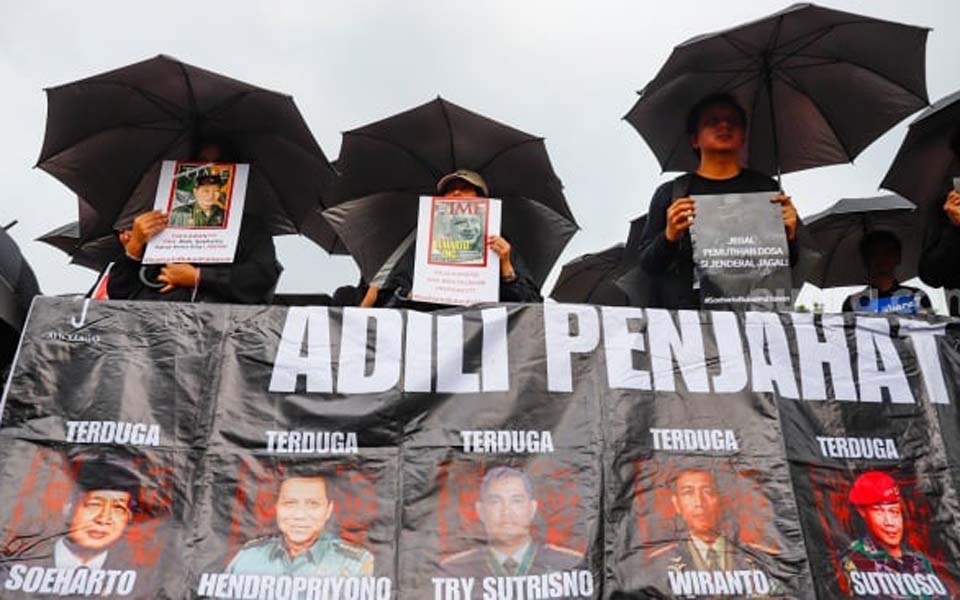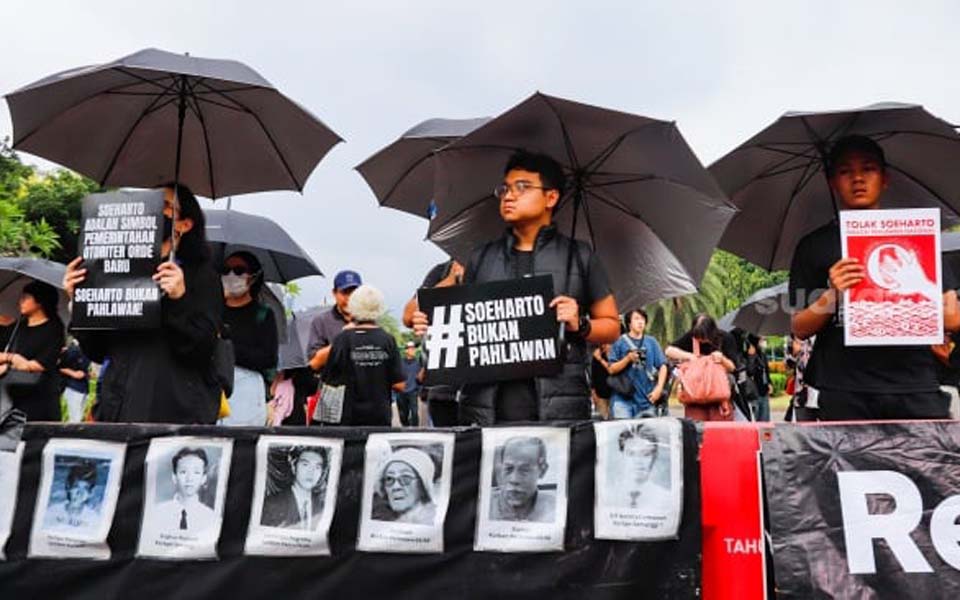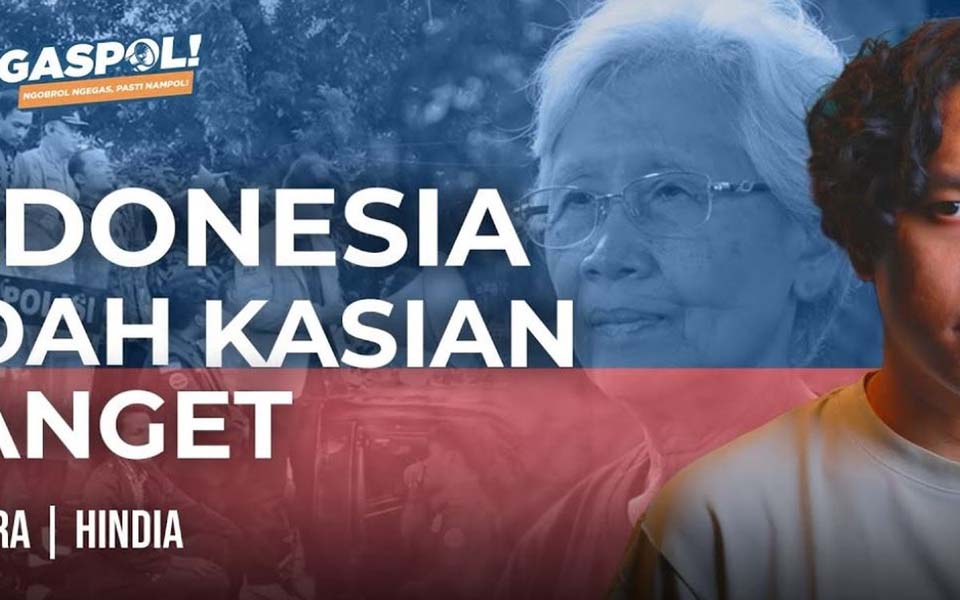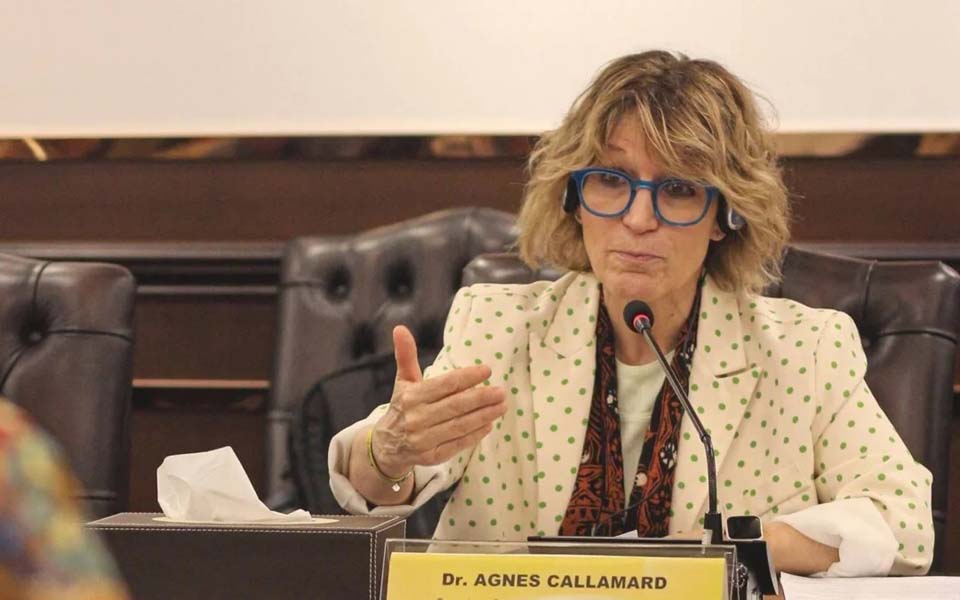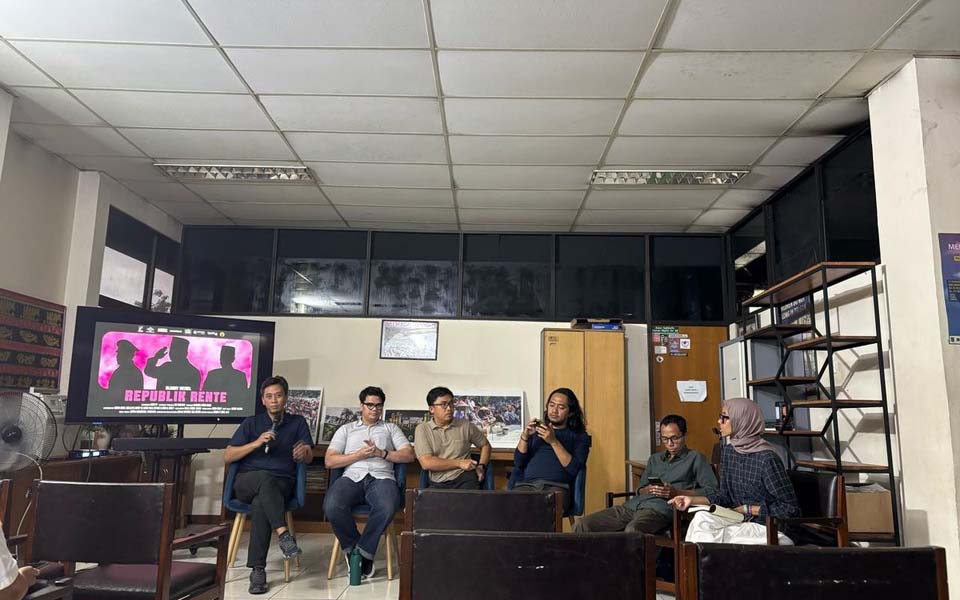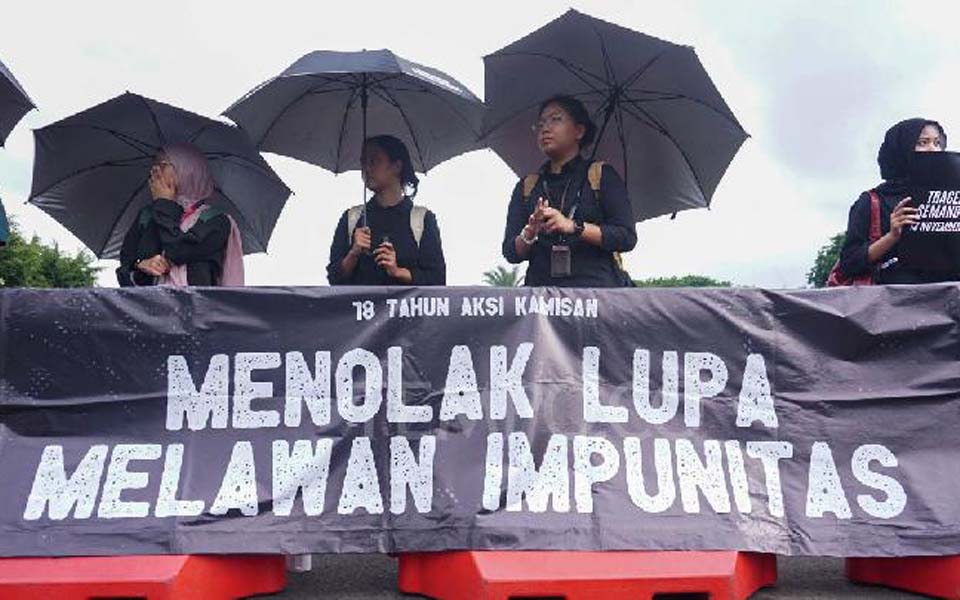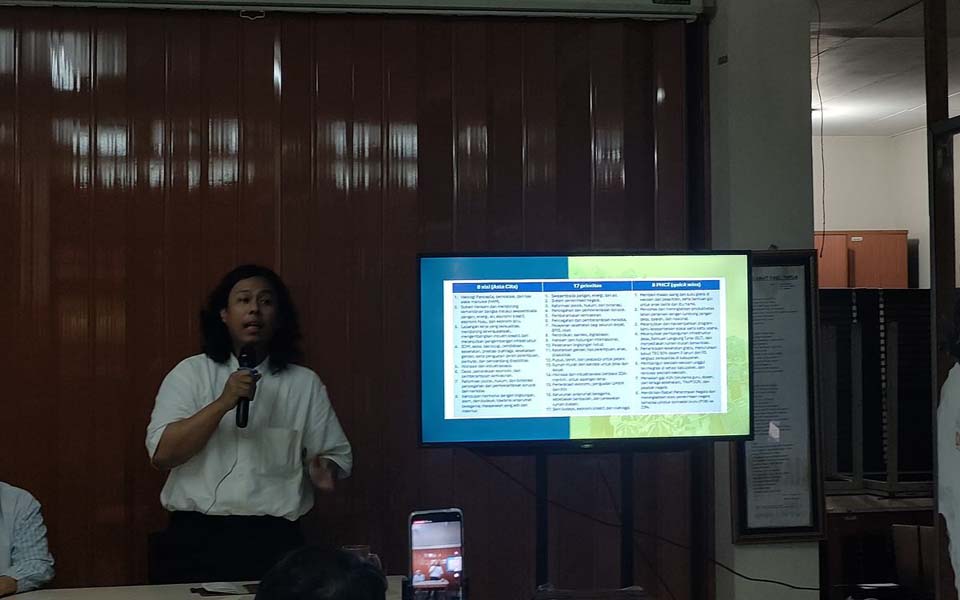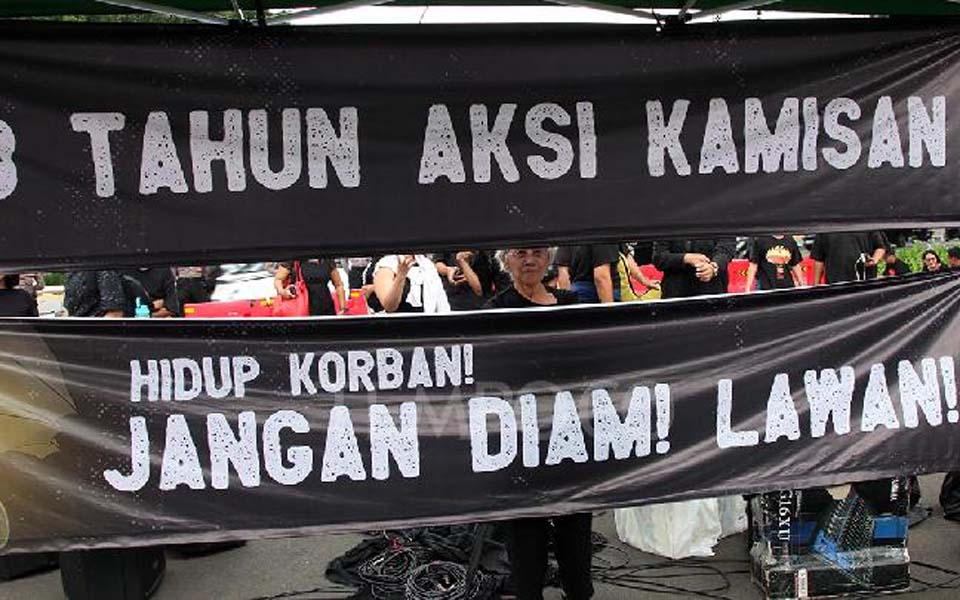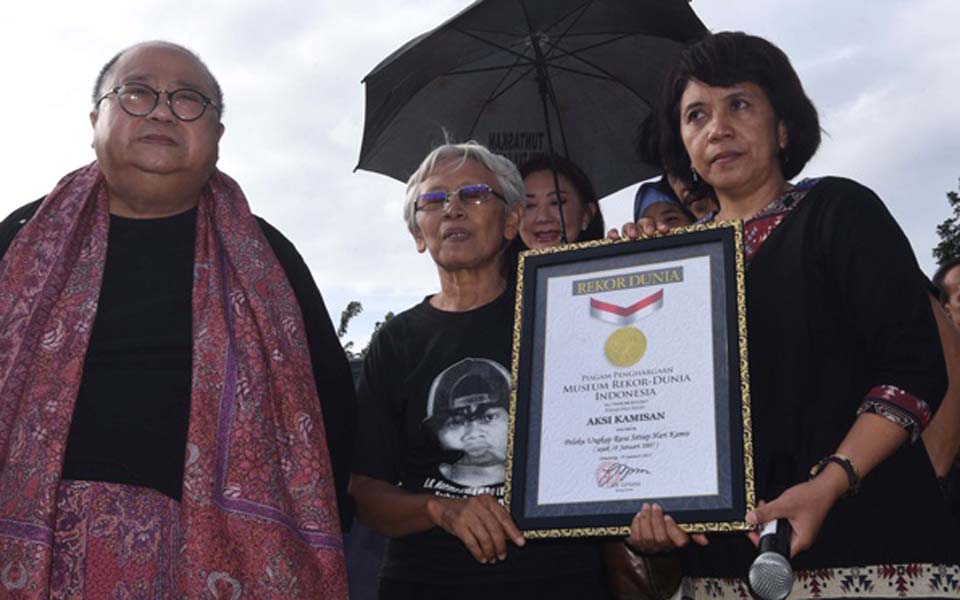I respectfully bow my head
To all of you the victims
Because to you alone I shall bow my head
[But] to the oppressors
Never will I bow in submission
I shall always stand erect
B. Josie Susilo Hardianto – This poem, composed by Wiji Thukul, was printed on a black T-shirt warn by Umar that afternoon. Umar is a victim of the 1965 killings. As a civil servant working in the political field for the Lampung provincial government at the time, Umar was accused of being part of the Indonesian Communist Party (PKI) movement. The accusations not only resulted in him loosing his job, but also his family. He was jailed and now lives alone without any relatives in Jakarta.
In the world of human rights violations in Indonesia, Umar and Wiji Thukul were victims. February 1998 was the last time that Wiji’s family heard any news about him. Speaking to his younger brother Wahyu Susilo, Wiji said he wanted to return home to the Central Java city of Solo. Up until this day however, Wiji has never returned home and there has been no news about his whereabouts. He simply disappeared.
Wiji was a poet and actively struggle to uphold human rights in Indonesia. Although for the government at that time, it was precisely this that made him an enemy. After the July 27, 1996 incident erupted, Wiji was accused of being responsible for the riots and hunted down by the security forces. As a person active in the People’s Democratic Party (PRD) at the time, he was one [among many] who became scapegoats.
Insensitive to pain
On that afternoon, Thursday February 12, as on previous Thursdays, Umar was preparing to join the Kamisan (Thursday action) gathering in front of the State Palace. This will be the 99th Kamisan. During the gathering, Wiji Thukul’s photograph was one of the images of victims of human rights violations that faithfully accompanied Umar and the families of victims.
Kamisan, for the victims and families of victims, is one of the efforts to ensure that the government, and also the Indonesian public, does not forget about cases of human rights violations in Indonesia. Even more than this, the silent actions represent a call to the government to take responsibility for the various cases of human rights violations that up until this day, has still not been fully resolved.
As of the 99the action today however, the government has continued to ignore them. “The government is insensitive to pain, numbed”, said Suciwati, the wife of human rights fighter Munir, who was assassinated in September 2004.
But the promise to fully resolve these cases remain only promises, and are never fulfilled. Cases of human rights violations such as the Talangsari incident, which have already been investigated by the National Human Rights Commission (Komnas HAM), are remain languishing with the Attorney General’s Office. The same fate has befallen earlier cases such as the Wasior-Wamena killings.
And this has also occurred in the fulfillment of economic, social and cultural rights. More recently, victims of the PT Lapindo Brantas mud flow disaster have been left biting their fingernails. A time when residents have lost their jobs, property, cultural roots and futures, the government seems to be increasingly loosing out to the power of big capital.
Two faces
With regard to the fulfillment of human rights in Indonesia, the face of the government is a face polished with makeup, full of falsehood. Speaking before the victims, President Susilo Bambang Yudhoyono promised to fully resolve the Talangsari case, but now, after Komnas HAM has completed its investigation, once again the AGO is reluctant to carry out a criminal investigation.
The reasons are always the same, the AGO does not want to violate the procedural stipulations, there must be a political decision first from the House of Representatives. Yet the Constitutional Court has already ruled that this is no longer the case. The many different approaches and urgings on the part of victims and their families have been unable to motivate the legal institutions into action.
In the name of the law the fulfillment of victims rights are again disregarded. This neglect is of course the exact opposite of the spirit presented by Indonesia before the world, a face full of concern and support for upholding human rights.
Two basic human rights conventions, namely civil and political rights along with the convention on economic, social and cultural rights have been signed. This is part of what has placed Indonesia as one of the countries, particularly in Asia, that has given serious attention to the issue of human rights. At the same time however, its own citizens continue to be neglected. Not one case of human rights violations has ever been resolved, and in fact victims are again falling.
A national action plan to ratify a number of human rights instruments has also dragged on and on. Included among these are the Rome Statute (establishing the International Criminal Court), the Convention on the Protection of the Rights of Migrant Workers and Family Members, the Optional Protocol on the Convention Against Torture, along with the Optional Protocol Convention on the Abolition of All Forms of Discrimination Against Women.
The reality of death and the suffering of victims are faced with criminal neglect. It is not surprising therefore that impunity persists. The head of Commission for Missing Persons and Victims of Violence (Kontras) Division for the Fulfillment of Victims Rights and Impunity Monitoring, Yati Andriyani, has stated that this situation means that those who are involved in and who should be held responsible for case of human rights violations are allowed to be left smiling, precisely because they are provided with latitude and are able to casually walk into the centres of political power.
It is quite reasonable then if Suciwati, Sumarsih (a family member of a victim of the 1998 Semanggi shootings), Yeti, Umar and other victims of human rights violations ask, what will be gained by Indonesia if they are allowed to lead the country. Because the fact is, during the time they were given the responsibility to lead, they failed. And those who are not involved (in human rights violations) and are currently part of the bureaucracy give the impression of neglect and are leaving the victims and their families to wrestle with uncertainty over when justice will become a reality.
Credibility
Indeed there is nothing that is perfect, but in the midst of growing crisis being faced by Indonesia, its citizens need a person who has a credibility that is far better than they have offered.
These two faces and two positions that tend to disregard human rights should be used as an unambiguous record for the public to assess candidates. Because, the elections are a time for evaluation, not just a festival of democracy.
Notes
1. Street performer, poet and People’s Democratic Party (PRD) member Wiji Thukul disappeared in February 1998. It is suspected he was a victim of the military abductions along with other activists which disappeared in Solo (Central Java). The bodies of Thukul and three other PRD activists have never been found and they are presumed dead.
2. On the night of September 30, a group of middle-ranking military officers kidnapped and killed six generals they accused of organising a coup against Indonesia’s President Sukarno. By blaming the incident on the Indonesian Communist Party, this provided the pretext for sections of the military, led by a Major General Suharto, to mount a bloody counter-revolution in which as many as 1 million communists and left wing sympathisers were killed, and hundreds of thousands of others interned.
3. Following Megawati Sukarnoputri’s popular election as chairperson of the Indonesian Democratic Party (PDI) in 1996, the Suharto regime, who feared a PDI lead Megawati (who could draw upon the tremendous popularity of her father Sukarno, the founding president of Indonesia) might threaten the state party Golkar’s dominance in the upcoming 1997 elections, sponsored a rebel PDI congress in Medan, North Sumatra, and succeeded in replacing her with their own pro-regime candidate, Suryadi. Following weeks of protests and the occupation of party’s headquarters in central Jakarta by pro-Megawati PDI supporters, on July 27 paid thugs backed by the military attacked and destroyed the PDI offices resulting in the death of as many as 50 people. Popular outrage at the attack sparked several days of mass rioting and violent clashes with police that was blamed on the People’s Democratic Party, whose members were hunted down and arrested as the masterminds behind the riots.
4. Kamisan – Roughly translated as “Thursday Actions”, every Thursday since January 18, 2007, the Solidarity Network for Victims and Families of Victims (JSKKK) has been organising one-hour silent protest actions in front of the State Palace calling on President Yudhoyono to resolve past human rights cases.
5. The Talangsari incident revolves around a dawn attack by a battalion of army soldiers on the village in Lampung regency on February 7, 1989, which was believed to be home to a group accused of attempting to establish an Indonesian Islamic state. On 12 September 1984, dozens of people were killed and injured when troops fired on Muslim demonstrators in the port district of Tanjung Priok, North Jakarta. In May 1998, security personnel shot into a crowd of student protesters from the Trisakti University near their campus in West Jakarta, killing four students and injuring several. This proved to be the spark which set-off three days of mass demonstrations and rioting in Jakarta. The Semanggi I and II cases involved the fatal shooting of dozens of student demonstrators in Jakarta in November 1998 and September 1999 respectively.
6. The 2001 incident in the Papuan district of Wasior stemmed from the killings of five elite police paramilitary personnel by unknown attackers during a raid on a base camp of a private firm in the area. Police carrying out a manhunt after the attack killed at least one civilian they accused of involvement. The 2003 case in Wamena district occurred after a raid on a military armoury by gunmen who made off with some 29 grenades and thousands of rounds of ammunition. The military, who had accused the rebel Free Papua Movement of carrying out the raid, deployed troops who allegedly had tortured and arrested civilians and carried out arson in the area.
[Translated by James Balowski.]






